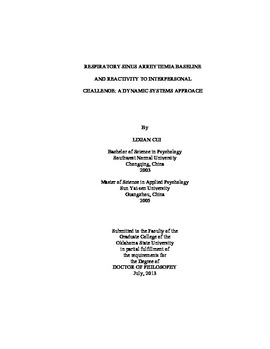| dc.contributor.advisor | Morris, Amanda Sheffield | |
| dc.contributor.author | Cui, Lixian | |
| dc.date.accessioned | 2014-09-24T14:16:53Z | |
| dc.date.available | 2014-09-24T14:16:53Z | |
| dc.date.issued | 2013-07 | |
| dc.identifier.uri | https://hdl.handle.net/11244/11010 | |
| dc.description.abstract | The current investigation examined associations between adolescent respiratory sinus arrhythmia (RSA) baseline and reactivity to interpersonal challenges (i.e., RSA during an angry event discussion) and adolescent emotion regulation and adjustment. This study also investigated whether parents' negative and positive affect influence adolescent RSA levels during parent-adolescent interactions (i.e., a conflict resolution task). Data were collected from 206 adolescents (mean age of 13.37) and their primary caregivers (predominantly biological mothers). Electrocardiogram (ECG) and respiration data were collected from adolescents and RSA variables were computed. Adolescent reported on parental acceptance, psychological control, and their depressive symptoms. Both parents and adolescents reported on adolescent emotion regulation and prosocial and aggressive behavior. Parent affect was coded during a parent-adolescent conflict resolution task. Multi-level latent growth modeling was employed to capture dynamic RSA changes and growth mixture modeling was employed to identify different RSA dynamic change patterns. Multi-level modeling was also used to distinguish the inter- and intra-individual effects of parent affect on adolescent RSA. Results indicate that higher RSA baseline was associated with more prosocial behavior among adolescents. Higher initial RSA decreases (RSA suppression) in response to challenge and then higher RSA increases (RSA recovery) were associated with better adolescent anger and sadness regulation (combined adolescent- and parent-report) and more prosocial behavior. Results of mixture modeling suggest that the group of adolescents who showed RSA suppression followed by RSA recovery was higher in parental acceptance, anger and sadness regulation, and prosocial behavior, and lower in parental psychological control, depressive symptoms, and aggressive behavior. These findings suggest that in response to interpersonal challenges, a dynamic pattern of initial RSA suppression followed by RSA recovery is an adaptive response, which indicates better emotion regulation abilities, and is related to better adjustment as well as positive parenting. Results also indicate that higher observed parent anger was associated with lower adolescent RSA levels, particularly among older adolescents, while higher observed parent positive affect was associated with higher RSA levels among adolescent girls. These findings imply that parent fluctuations in affect during social interactions may shape adolescents' development of vagal functioning. | |
| dc.format | application/pdf | |
| dc.language | en_US | |
| dc.rights | Copyright is held by the author who has granted the Oklahoma State University Library the non-exclusive right to share this material in its institutional repository. Contact Digital Library Services at lib-dls@okstate.edu or 405-744-9161 for the permission policy on the use, reproduction or distribution of this material. | |
| dc.title | Respiratory sinus arrhythmia baseline and reactivity to interpersonal challenge: A dynamic systems approach | |
| dc.contributor.committeeMember | Criss, Michael M. | |
| dc.contributor.committeeMember | Larzelere, Robert E. | |
| dc.contributor.committeeMember | Pollak, Michael H. | |
| dc.contributor.committeeMember | Harrist, Amanda W. | |
| osu.filename | Cui_okstate_0664D_12860.pdf | |
| osu.accesstype | Open Access | |
| dc.type.genre | Dissertation | |
| dc.type.material | Text | |
| thesis.degree.discipline | Human Sciences | |
| thesis.degree.grantor | Oklahoma State University | |
